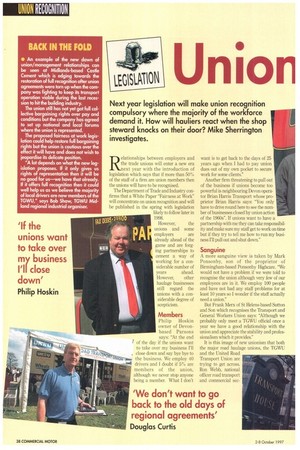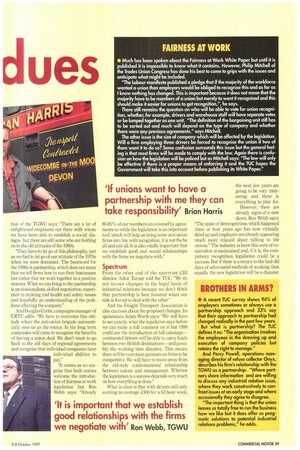Union
Page 40

Page 41

If you've noticed an error in this article please click here to report it so we can fix it.
dues
Rtelationships between employers and he trade unions will enter a new era iext year with the introduction of legislation which says that if more than 50% of the staff of a firm are union members then the unions will have to be recognised.
The Department of Trade and Industry confirms that a White Paper "Fairness at Work" will concentrate on union recognition and will be published in the spring with legislation likely to follow later in 1998.
However, the unions and some employers are already ahead of the game and are forging partnerships to cement a way of working for a considerable number of years ahead.
However, other haulage businesses still regard the unions with a considerable degree of scepticism.
Members
Philip Hoskin owner of Devonbased Parsons says: "At the end / of the day if the unions want to take over my business I'll , close down and say bye bye to the business. We employ 40 drivers and I doubt if 5% are members of the union, although we never stop anyone being a member, What I don't want is to get back to the days of 25 years ago when I had to pay union dues out of my own pocket to secure work for some clients!'
Another firm threatening to pull out of the business if unions become too powerful is neighbouring Devon operator Brian Harris Transport whose proprietor Brian Harris says: "You only have to drive round here to see the number of businesses closed by union action of the 1960s". If unions want to have a partnership with me they can take responsibility and make sure my staff get to work on time but if they try to tell me how to run my business I'll pull out and shut down."
Sanguine
A more sanguine view is taken by Mark Ponsonby, son of the proprietor of Birmingham-based Ponsonby Highcare. "We would not have a problem if we were told to recognise the union although very few of our employees are in it. We employ 100 people and have not had any staff problems for at least 10 years so I wonder if the staff actually need a union."
But Frank Merx of St Helens-based Sutton and Son which recognises the Transport and General Workers Union says: "Although we probably only meet a TGWU official once a year we have a good relationship with the union and appreciate the stability and professionalism which it provides."
It is this image of new unionism that both the major road haulage unions, the TGWU and the United Road Transport Union are trying to get across. Ron Webb, national officer road transport and commercial sec
tion of the TGWU says: "There are a lot of enlightened employers out there with whom we have been able to establish a social dialogue but there are still some who are holding on to the old attitudes of the 1980s.
"They have to let go of this philosophy, just as we had to let go of our attitude of the 1970s when we were dominant. The buzzword for the 1990s is partnership, which does not mean that we tell firms how to run their businesses but rather that we work together in a positive manner. What we can bring to the partnership is professionalism, skilled negotiation, experience in training and health and safety issues and hopefully an understanding of the problems affecting the company."
And Douglas Curtis, campaigns manager of CRTU adds: "We have to overcome this attitude where the anti-union brigade automatically sees us as the enemy. In the long term companies will come to recognise the benefits of having a union deal. We don't want to go back to the old days of regional agreements and recognise that individual companies have individual abilities to pay."
"It comes as no surprise that both unions welcome the introduction of fairness at work legislation but Ron Webb says: "Already 80-85% of our members are covered by agreements so while the legislation is an important tool, which will help us bring some anti-union firms into line with recognition, it is not the be all and end all. It is also vitally important that we establish good and sound relationships with the firms we negotiate with."
Spectrum
From the other end of the spectrum CBI director Adair Turner told the TUC: "We do not favour changes in the legal basis of industrial relations because we don't think that partnership is best fostered when one side is forced to deal with the other."
And the Freight Transport Association is also cautious about the proposed changes. Its spokesman Adam Worth says: "We will have to see exactly what the legislation says before we can make a full comment on it but 1998 could see the introduction of full cabotagecontinental drivers will be able to carry loads between two British destinations—and possibly the working time directive. This means there will be even more pressure on firms to be competitive. We will have to move away from the old-style confrontational relationship between unions and management. Whether the legislation is a success depends very much on how everything is done."
What is clear is that with drivers still only earning an average £300 for a 62-hour week. the next few years are going to be very interesting and there is everything to play for.
However, there are already signs of a new dawn. Ron Webb says: The spate of derecognitions which happened three or four years ago has now virtually dried up and employers are already appearing much more relaxed about talking to the unions." The industry is keen this aura of cooperation is maintained and, if it is, the compulsory recognition legislation could be a success. But if there is a return to the bad old days of adversarial methods of working then equally the new legislation will be a disaster.








































































































